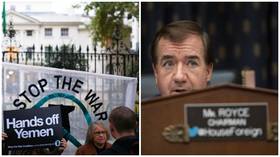Foreign Affairs Committee chair cited Saudi talking points in Yemen debate, now he lobbies for them

In 2017 during a House debate on the Yemeni war, the chair of the Foreign Affairs Committee cited almost verbatim the talking points provided by a lobbying firm serving Saudi Arabia. Now he is working for one such firm.
The extraordinary insight into the workings of the US legislature, which probably shouldn’t surprise more seasoned observers, came from The Intercept on Thursday. The publication obtained the talking points which had been provided in November 2017 to Representative Ed Royce and his source was Ari Fridman, a lobbyist with the law firm Hogan Lovells, which has long represented the Saudi government in Washington D.C.
Called “a fact sheet” by the sender, they were meant to help Royce during a House debate on a proposal to invoke the War Powers Act to stop US support for the Saudi-led military intervention in Yemen. And help they did. During two separate remarks to fellow lawmakers, Royce cited verbatim –or almost verbatim– several of the talking points as he was arguing that the Houthi rebels in Yemen, whom the Saudis were trying to defeat, were an Iranian proxy force.
“Part of the problem here is the leaders of the Houthi militia were indoctrinated in Qom, in Iran, as part of an Iranian attempt to construct a Hezbollah-like proxy in Yemen,” he said at one point. The corresponding Saudi text reads: “During the 1990s, the leaders of the Houthi militia were indoctrinated in the Iranian city of Qom as part of an Iranian attempt to construct a Hezbollah-like proxy in Yemen.”
“Mr. Speaker, part of the complexity here in this tragedy is that Iran does want to turn the Houthis into a Yemeni version of Hezbollah, thereby turning Yemen into a second Lebanon, where a militia is constantly holding the government hostage,” Royce said at another point. The talking points state: “Iran wants to turn the Houthis into a Yemeni version of Hezbollah, thereby turning Yemen into a second Lebanon, where a militia is constantly holding the government hostage.”
Also on rt.com Senate votes to uphold Trump veto on ending US support for Saudi-led war in YemenSome other words said by Royce were, in fact, readouts from the lobbyist document. The talking points were disclosed to the Department of Justice under the Foreign Agents Registration Act and thus became available to the public.
The Intercept noticed that, while lobbyists working for foreign government are required to report their communications with Congress members, few have followed the rule until the recent crackdown on foreign agents. The tightening of screws was triggered by the “Russian meddling” hysteria, but apparently what it reveals is the sway that some other governments have on Washington policies.
Also on rt.com Royce rolls: Congressman, fervent decrier of Russia, won’t seek re-electionRoyce retired from the Congress in January and is now working for the lobbying division of Brownstein Hyatt Farber Schreck, the report said. The company currently holds a $125,000-per-month retainer with Saudi Arabia. Having on board a person with such intimate knowledge of how the job needs to be done is probably a big advantage for the firm.
The scoop was apparently published ahead of a Senate hearing, in which the US lawmakers will attempt to overcome President Donald Trump’s veto on a resolution on Yemen. It attempted to do exactly what was discussed in November 2017 – use the War Powers Act to stop US support of the Saudis in Yemen. Trump axed the proposal in April, marking the second time in his presidency when he exercised his power of veto.
Think your friends would be interested? Share this story!














